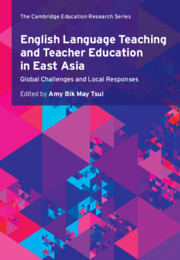Book contents
- English Language Teaching and Teacher Education in East Asia
- English Language Teaching and Teacher Education in East Asia
- Copyright page
- Contents
- Figures
- Tables
- Contributors
- Preface
- Acknowledgements
- 1 Glocalization and Grobalization: Critical Issues in English Language Teaching and Teacher Education in East Asia
- 2 Concepts of Globalization and English Language Teacher Education in Singapore
- 3 Learning to Teach English in Hong Kong: Transformation and Tensions Over Two Decades of English Language Teacher Education Policy
- 4 Meeting National Needs in English Language Teacher Education: Global Perspectives in Malaysian Initiatives
- 5 English Teacher Education in Postcolonial Philippines
- 6 China Going Global: Challenges and Responses in English As a Foreign Language Teaching and Teacher Education
- 7 English Education Reform, Teacher Education, and the Tokyo Olympics: Perfect Timing?
- 8 English Language Teacher Education in South Korea: Changes and Challenges
- 9 Preparing English Teachers in the Twenty-First Century: The Case of Taiwan
- 10 English Language Teacher Education in Thailand: A Mix of Global and Local
- 11 Interrogating Troubling Issues in Vietnam’s English Language Teacher Education
- Index
- References
10 - English Language Teacher Education in Thailand: A Mix of Global and Local
Published online by Cambridge University Press: 17 October 2020
- English Language Teaching and Teacher Education in East Asia
- English Language Teaching and Teacher Education in East Asia
- Copyright page
- Contents
- Figures
- Tables
- Contributors
- Preface
- Acknowledgements
- 1 Glocalization and Grobalization: Critical Issues in English Language Teaching and Teacher Education in East Asia
- 2 Concepts of Globalization and English Language Teacher Education in Singapore
- 3 Learning to Teach English in Hong Kong: Transformation and Tensions Over Two Decades of English Language Teacher Education Policy
- 4 Meeting National Needs in English Language Teacher Education: Global Perspectives in Malaysian Initiatives
- 5 English Teacher Education in Postcolonial Philippines
- 6 China Going Global: Challenges and Responses in English As a Foreign Language Teaching and Teacher Education
- 7 English Education Reform, Teacher Education, and the Tokyo Olympics: Perfect Timing?
- 8 English Language Teacher Education in South Korea: Changes and Challenges
- 9 Preparing English Teachers in the Twenty-First Century: The Case of Taiwan
- 10 English Language Teacher Education in Thailand: A Mix of Global and Local
- 11 Interrogating Troubling Issues in Vietnam’s English Language Teacher Education
- Index
- References
Summary
In Thailand, English proficiency is generally low but demand for English is high. Hence, the need to improve the quality of English language teacher education is urgent. Pre-service education is divided into three main types: first, Bachelor of Education (BEd) programmes for school teacher preparation, mostly run by Rajabhat teacher training institutes which are highly traditional and may manifest nationalist concerns of Thainess and preconventional morality; second, master’s programmes run by universities for university teacher preparation; and third, short initial training courses run by private companies which prepare foreigners, often native speakers of English, to be teachers. Demand for foreign teachers of English in Thailand is high since the native-speaker model of English is prevalent. The certification of teachers by the Teachers Council of Thailand following pre-service education focuses on knowledge not teaching ability, and the application of certification to foreign teachers is inconsistent. Until recently, in-service teacher education has either promoted inequalities by targeting the best teachers or has been of debatable quality. Local resistance to global trends in English language teacher education suggests that English language education in Thailand may not be able to cope with an increasingly connected and changing world.
Keywords
- Type
- Chapter
- Information
- English Language Teaching and Teacher Education in East AsiaGlobal Challenges and Local Responses, pp. 195 - 216Publisher: Cambridge University PressPrint publication year: 2020
References
- 2
- Cited by



